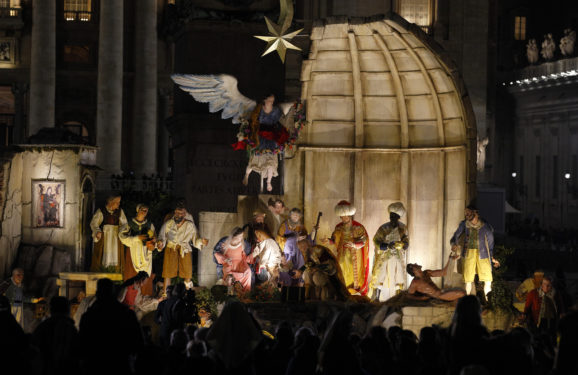By Charles Collins

LEICESTER, United Kingdom (Crux)- For most people, Christmas is a joyous time with family and friends; but this joy can turn to grief when those family and friends have died.
How people deal with this sadness was the focus of a survey published Dec. 10 from St Mary’s University, Twickenham, that asked 2000 people across the United Kingdom what they do at Christmas in memory of deceased loved ones.
The survey is part of the University’s project, The Art of Dying Well, which offers practical and spiritual support to those faced with the prospect of death and dying.
“The Art of Dying Well commissioned this survey to try and help the bereaved navigate a way through what can be a very tough season,” said Maggie Doherty, the director of the project.
Those taking the survey were given 16 possible ways to remember the deceased, although they were given the opportunity to write in other options.
The most popular option – at 32 percent – was to simply share memories of the loved one with friends and family.
Other popular activities to remember the dead included lighting a candle (20 percent), laying a wreath on a grave (20 percent), saying a prayer (16 percent), and making a special toast (15 percent).
“Holidays are a time to get the family together, particularly at Christmas. When a loved one is missing from those get-togethers, the sense of loss can be overwhelming,” Doherty told Crux.
The survey noted that the younger generation is finding new ways to remember the dead during the Christmas season. Those aged 18 to 24 are more likely than older people to plant a tree, release a balloon, or tie a yellow ribbon around the trunk of the Christmas tree.
The report noted younger people are also more likely to make a Christmas decoration including the loved one’s name.
Another growing trend – possibly helped along by social media – is doing something in a deceased loved one’s name, such as a charity run or charitable donation.
Lynn Bassett, who served as a Catholic chaplain for 14 years in hospitals and hospices, told The Art of Dying Well that it can be good to go out for a short while on Christmas Day if you are feeling bereaved.
“Going out gives you some punctuation if you are worried your sadness might blight the day,” she said.
She said the first Christmas after a loved one has died is “always a big hurdle.”
“People would say ‘we don’t know how we’re going to approach this. Should we carry on as normal? Or not celebrate this year because it doesn’t seem right?’” Bassett said.
“When I was a chaplain in the hospice, people would come to the Christmas service and say ‘it was so hard to come, I thought I wouldn’t be able to. Now I have, it was really hard but I’m so glad I did.’ There is something very positive about symbolic and physical activities. People cry but there’s an ability to move on. It allows you a chance to remember, to think about it and that is healthy!” she continued.
“If we could allow ourselves to be more open to discussing death in general and sharing memories of people who’ve died even at Christmas it will probably be healing for everybody,” she said. “Healing comes through that pain. Suppressing it will mean it emerges in an unhealthy way somewhere else.”
Yet the modern age has helped people suppress the pain more and more: Elderly and infirm people are often placed in nursing homes, and more and more deaths take place in institutional settings such as hospitals.
“Death has become a medicalized event, so fewer people are alongside their loved ones as they die or know what to expect about the dying process,” Doherty told Crux.
It is one of the reasons The Art of Dying Well was started, to help people achieve a “good death” and fight the taboos that surround dying.
This is especially true at Christmas, when society preaches you should be merry and joyful, but bereavement means the sense of isolation and desolation can grow exponentially.
“Christmas is often a very painful time for the bereaved – whether it is the first year or the fortieth year since the death of a loved one – the empty chair at the Christmas table still hits hard. We hope that the findings will help others discover a hope-filled way to get through the countdown to Christmas,” Doherty said.

My husband died in Jan of cancer and I haven’t celebrated any holiday or bdays at all this year out of respect for him and because I just can’t. To ease the pain and to turn that grief into something positive, I volunteer my time to a soup kitchen on the holidays and donate gifts for the needy for Christmas at one of the churches I’m affiliated with. Grief is love with no place to go, I’m directing my grief and love to others. It’s like a hug, you give and get at the same time. It’s a win win.